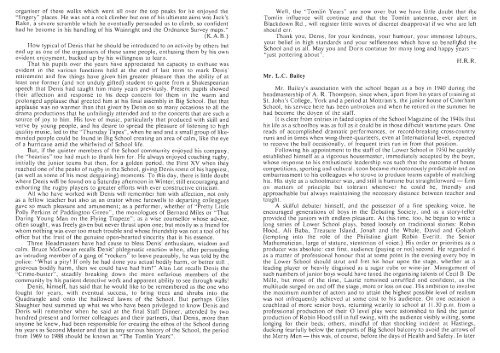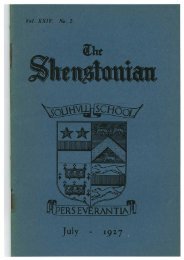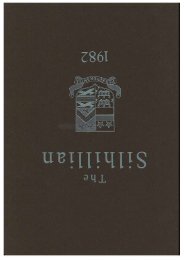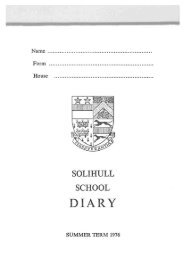SHENSTON IAN 88 - Old Silhillians Association
SHENSTON IAN 88 - Old Silhillians Association
SHENSTON IAN 88 - Old Silhillians Association
Create successful ePaper yourself
Turn your PDF publications into a flip-book with our unique Google optimized e-Paper software.
organiser of these walks which went all over the top peaks for he enjoyed the<br />
gingery" places. He was not a rock climber but one of his ultimate aims was Jack's<br />
Rake, a severe scramble which he eventually persuaded us to climb, so confident<br />
had he become in his handling of his Wainright and the Ordnance Survey maps."<br />
(K.A.B.)<br />
How typical of Denis that he should be introduced to an activity by others but<br />
end up as one of the organisers of these same people, enthusing them by his own<br />
evident enjoyment, backed up by his willingness to learn.<br />
That his pupils over the years have appreciated his capacity to enthuse was<br />
evident in the various functions held at the end of last term to mark Denis'<br />
retirement and few things have given him greater pleasure than the ability of at<br />
least one former (and not unduly gifted) student to quote from a Shakespearian<br />
speech that Denis had taught him many years previously. Present pupils showed<br />
their affection and response to his deep concern for them in the warm and<br />
prolonged applause that greeted him at his final assembly in Big School. But that<br />
applause was no warmer than that given by Denis on so many occasions to all the<br />
drama productions that he unfailingly attended and to the concerts that are such a<br />
source of joy to him. His love of music, particularly that produced with skill and<br />
verve by young people, and his desire to spread the pleasure of listening to high<br />
quality music, led to the "Thursday Tapes", when he and and a small group of likeminded<br />
people could be found in Big School creating an area of calm, like the eye<br />
of a hurricane amid the whirlwind of School life.<br />
But, if the quieter members of the School community enjoyed his company,<br />
the "hearties" too had much to thank him for. He always enjoyed coaching rugby,<br />
initially the junior teams but then, for a golden period, the First XV when they<br />
reached one of the peaks of rugby in the School, giving Denis some of his happiest,<br />
(as well as some of his most despairing) moments. To this day, there is little doubt<br />
where Denis will be found on a Saturday afternoon in Winter; still encouraging and<br />
exhorting the rugby players to greater efforts with ever constructive criticism.<br />
All who have worked with Denis will remember him with affection, not only<br />
as a fellow teacher but also as an orator whose farewells to departing colleagues<br />
gave so much pleasure and amusement; as a performer, whether of "Pretty Little<br />
Polly Perkins of Paddington Green", the monologues of Bernard Miles or "That<br />
Daring Young Man on the Flying Trapeze"; as a wise counsellor whose advice,<br />
often sought, was freely given but never thrust upon one; but mostly as a friend for<br />
whom nothing was ever too much trouble and whose friendship was not a tool of his<br />
office but the fruit of the genuine open-hearted sincerity that is his essence.<br />
Three Headmasters have had cause to bless Denis' enthusiasm, wisdom and<br />
calm. Bruce McGowan recalls Denis' phlegmatic reaction when, after persuading<br />
an intruding member of a gang of "rockers" to leave peaceably, he was told by the<br />
police: "What a pity! If only he had done you actual bodily harm, or better still ,<br />
grievous bodily harm, then we could have had him!" Alan Lee recalls Denis the<br />
"Crime-buster", steadily breaking down the more nefarious members of the<br />
community by his patient detective woik and apparent ability to see through walls!<br />
Denis, himself, has said that he would like to be remembered as the one who<br />
fought for years, with eventual success, to bring trees and shrubs into the<br />
Quadrangle and onto the hallowed lawns of the School. But perhaps Giles<br />
Slaughter best summed up what we who have been privileged to know Denis and<br />
Doris will remember when he said at the final Staff Dinner, attended by two<br />
hundred present and former colleagues and their partners, that Denis, more than<br />
anyone he knew, had been responsible for creating the ethos of the School during<br />
his years as Second Master and that in any serious history of the School, the period<br />
from 1969 to 19<strong>88</strong> should be known as "The Tomlin Years".<br />
Well, the "Tomlin Years" are now over but we have little doubt that The<br />
Tomlin influence will continue and that the Tomlin antennae, ever alert in<br />
Blackdown Rd., will register little waves of discreet disapproval if we who are left<br />
should err.<br />
Thank you, Denis, for your kindness, your humour, your immense labours,<br />
your belief in high standards and your selflessness which have so benefiyed the<br />
School and us all. May you and Doris continue for many long and happy years —<br />
"just pottering about".<br />
H.R.R.<br />
Mr. L.C. Bailey<br />
Mr. Bailey's association with the school began as a boy in 1940 during the<br />
headmastership of A. R. Thompson, since when, apart from his years of training at<br />
St. John's College, York and a period at Mottram's, the junior house of Caterham<br />
School, his service here has been unbroken and when he retired in the summer he<br />
had become the doyen of the staff.<br />
It is clear from entries in faded copies of the School Magazine of the 1940s that<br />
his life as a schoolboy was as full as it could be in those difficult wartime years. One<br />
reads of accomplished dramatic performances, or record-breaking cross-country<br />
runs and in times when wing-three-quarteers, even at International level, expected<br />
to receive the ball occasionally, of frequent tries run in from that position.<br />
Following his appointment to the staff of the Lower School in 1950 he quickly<br />
established himself as a vigorous housemaster, immediately accepted by the boys,<br />
whose response to his enthusiastic leadership was such that the outcome of house<br />
competitions, sporting and cultural, soon became monotonously predictable and an<br />
embarrassment to his colleagues who strove to produce teams capable of matching<br />
his. His style as a schoolmater was, and still is humane but straightforward — firm<br />
on matters of principle but tolerant whenever he could be, friendly and<br />
approachable but always maintaining the necessary distance between teacher and<br />
taught.<br />
A skilful debater himself, and the possessor of a fine speaking voice, he<br />
encouraged generations of boys in the Debating Society, and as a story-teller<br />
provided the juniors with endless pleasure. At this time, too, he began to write a<br />
long series of Lower School plays, based loosely on traditional stories: Robin<br />
Hood, Ali Baba, Treasure Island, Jonah and the Whale, David and Goliath<br />
(tempting into the role of the Philistine giant Robin Everitt, the Senior<br />
Mathematician, large of stature, stentorian of voice.) His order or priorities as a<br />
producer was absolute: cast first, audience (paying or not) second. He regarded it<br />
as a matter of professional honour that at some point in the evening every boy in<br />
the Lower School should strut and fret his hour upon the stage, whether as a<br />
leading player or heavily disguised as a sugar cube or wine-jar. Management of<br />
such numbers of junior boys would have taxed the organising talents of Cecil B. De<br />
Mille, but most of the time, Laurie remained unruffled and confident, as the<br />
multitude surged on and off the stage, more or less on cue. His ambition to involve<br />
the maximum number of actors and to attain the highest possible level of realism<br />
was not infrequently achieved at some cost to his audience. On one occasion a<br />
coachload of more senior boys, returning wearily to school at 11.30 p.m. from a<br />
professional production of their 0 level play were astonished to find the junior<br />
production of Robin Hood still in full swing, with the audience visibly wilting, some<br />
loriging for their beds, others, mindful of that shocking incident at Hastings,<br />
ducking fearfully below the ramparts of Big School balcony to avoid the arrows of<br />
the Merry Men — this wa's, of course, before the days of Health and Safety. In later











